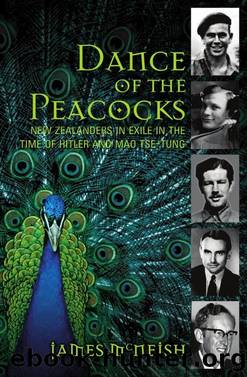Dance of the Peacocks by James Mcneish

Author:James Mcneish [James McNeish]
Language: eng
Format: epub
ISBN: 9781869796624
Publisher: Penguin Random House New Zealand
Published: 2012-01-15T00:00:00+00:00
Much has been written about the New Zealand Divisionâs role as the spearhead of the British army, but little has been said of its Intelligence war. Oliver Leese, who succeeded Montgomery in command of Eighth Army in Italy, claimed that if it had not been for Freyberg and his division âthe whole advance would have had to be haltedâ. Just how much Freyberg owed to the Intelligence he received from a litter of scholars in a clapped-out canvas-sided truck is hard to say. Colonel Quereeâs claim that Freyberg had the best Intelligence staff in the British army, Cox would today consider exaggerated (both Cox and Davin had sat at the feet of the master, Montgomeryâs chief of Intelligence, the Englishman Bill Williams). Kippenbergerâs statement about Cox, Davin and Costello â âthe best Intelligence staff anywhere at Divisional levelâ â is probably nearer the mark.
It was partly due to their Oxford and Cambridge training â the scholarâs skill at evaluating and projecting information in terms that field commanders could grasp and translate into action. âThey didnât want screeds of evaluation,â Cox says, âbut something to act on. They wanted to know, âWhere are the Tiger tanks?ââ
It was partly the pressure put upon them by Freybergâs senior officers, a virile and formidable bunch, outspoken and critical, who demanded nightly conferences during battle, and sometimes during the day as well. In Italy, they got the trim, sparrow-sized Geoffrey Cox at his best. Less discursive than Davin, more punctual than Costello, he could make them laugh. âThe frontâ, Cox declared to a gathering of battalion commanders, approaching Ferrara on the Adriatic, âis as quiet as Dee Street, Invercargill, on a rainy Saturday night.â
But it was also due to Freyberg himself. What was Freybergâs contribution to the war? In an essay published in 1975, Davin puts the question to himself, then answers it, saying: âIn the first place, the New Zealand Division, as he shaped and led it. True, the human material was excellent. But it was Freyberg who made of that material such a superb instrument of war.â This applied to his Intelligence trio. Freyberg gave much rope to his âuniversity boysâ, but he also set standards below which they were ashamed to fall.
Freybergâs gradual relaxation of the outward forms of discipline â men and officers would call one another by first names â meant a growing trust in one another, and in the inhabitants of the âIâ truck. This is the same truck, its canvas sides now ventilated by bullet holes, that Cox petitioned for and was awarded in Libya in 1941. Senior staff officers like R.C. Queree and Leonard Thornton, while censoring its scrofulous splendour, nevertheless came to have confidence in the inmates and to rely on their pronouncements.
Download
This site does not store any files on its server. We only index and link to content provided by other sites. Please contact the content providers to delete copyright contents if any and email us, we'll remove relevant links or contents immediately.
Women and Jewish Marriage Negotiations in Early Modern Italy by Howard Tzvi Adelman(460)
Warrior King by Wilbur Smith(425)
The Battle of Austerlitz by 50minutes(316)
18 real-life stories of serial killers and murderers with solved and unsolved killings from the USA, UK, Europe, and beyond. by Ben Oakley(313)
Youth, Heroism and War Propaganda: Britain and the Young Maritime Hero, 1745â1820 by D. A. B. Ronald(306)
Violence and Emotions in Early Modern Europe by Susan Broomhall;Sarah Finn;(305)
Who's Who in the Zulu War, 1879: The British by Adrian Greaves Ian Knight(303)
The American Crisis by Unknown(297)
The Seeker by S. G. MacLean(250)
The Origins of French Absolutism, 1598-1661 by Alan James(247)
The Dutch East India Company and British East India Company: The History and Legacy of the Worldâs Most Famous Colonial Trade Companies by Charles River Editors(238)
The Traitor of Colditz by Robert Verkaik(234)
The Thirty Years War â Complete by Friedrich Schiller(227)
Fires of Faith by Catholic England under Mary Tudor(224)
A Genius for Confusion by Richard M. Fried(223)
Interest and Connection in the Eighteenth Century by Jacob Sider Jost(221)
The Slave Trade in Africa by Simon Webb;(220)
Invisible Worlds by Peter Marshall(219)
The Opium Wars: Exploring the Addiction of Empires from Beginning to End by Ramos Adrian & Compacted History(216)
